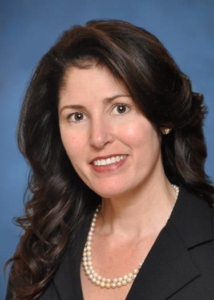 By Melissa J. Anderson (New York City)
By Melissa J. Anderson (New York City)
Anne Izzillo, President of the Financial Women’s Association, believes sincerely in the power of networking – in fact, she said, that’s how she got involved in the group in the first place. “I lived and worked in London for 14 and a half years and I came back in 1999, basically without a network.”
“Everybody had gone to the four winds in the almost 15 years I was away,” she explained. “And somebody I know, a friend of a friend actually, suggested, because I was bemoaning the fact that I didn’t have a network anymore… that I join the FWA.”
“You can join and meet some great women and foster some great relationships, or you can actually join a committee and get involved in the organization and that’s what I did from day one.”
On Tuesday, The Financial Women’s Association of New York celebrated its 2011 Holiday Party at the NASDAQ Tower in Times Square with networking and discussion. Hosted by NASDAQ CEO Robert Greifield, the event featured an interview between Greifield and CNBC reporter Scott Wapner.
A new partnership between the FWA and The Daily Beast’s Women in the World project was also announced at the event, whereby the FWA will have a page on the WITW website and partner on events.
Kim Azzarelli, Vice President, New Ventures at Newsweek Daily Beast and President of the Women in the World Foundation, announced the project. Azzarelli, whose background is in corporate law, said the partnership would connect different sectors to benefit women globally. She explained, “If we could connect the dots across all of the sectors, we could really do a lot for women and girls, and connect the dots across the generations as well.”
The partnership is one step in making the FWA a more global organization, which, Izzillo said, is one of her key goals for the next year and beyond. “Eventually, someday I’d love to see the FWA be an international or a global organization,” she said.
 By Melissa J. Anderson (New York City)
By Melissa J. Anderson (New York City)
 By Melissa J. Anderson (New York City)
By Melissa J. Anderson (New York City) By Melissa J. Anderson (New York City)
By Melissa J. Anderson (New York City) By Robin Madell (San Francisco)
By Robin Madell (San Francisco) By Melissa J. Anderson (New York City)
By Melissa J. Anderson (New York City) By Melissa J. Anderson (New York City)
By Melissa J. Anderson (New York City) By Melissa J. Anderson (New York City)
By Melissa J. Anderson (New York City) By Melissa J. Anderson (New York City)
By Melissa J. Anderson (New York City)
 By Melissa J. Anderson (New York City)
By Melissa J. Anderson (New York City)